Is your Ragdoll cat truly just fluffy, or might they be hiding extra weight under that fur? It’s hard to tell when their coat is so thick. Feeling your cat’s spine and ribs can tell you a lot. If you easily feel these bones, your cat is likely a healthy weight. But, if your cat’s belly skin is bulging, they might need a diet change.
Comparing your Ragdoll to others of the breed can be helpful. But, keep in mind, every cat is different. Some Ragdolls have shorter legs and are naturally bigger. This doesn’t always mean they’re overweight. Understanding these differences is key to helping your cat stay healthy and active.
Key Takeaways:
- Fluffy fur can hide a cat’s true body condition, so doing touch checks is vital.
- If you can feel their spine and ribs well, they’re probably at a good weight.
- A full primordial pouch might mean they’re too heavy.
- Looking at similar breeds can give you good perspective.
- Not every Ragdoll with short legs and a sturdy body is overweight.
Understanding Your Ragdoll’s Body Condition
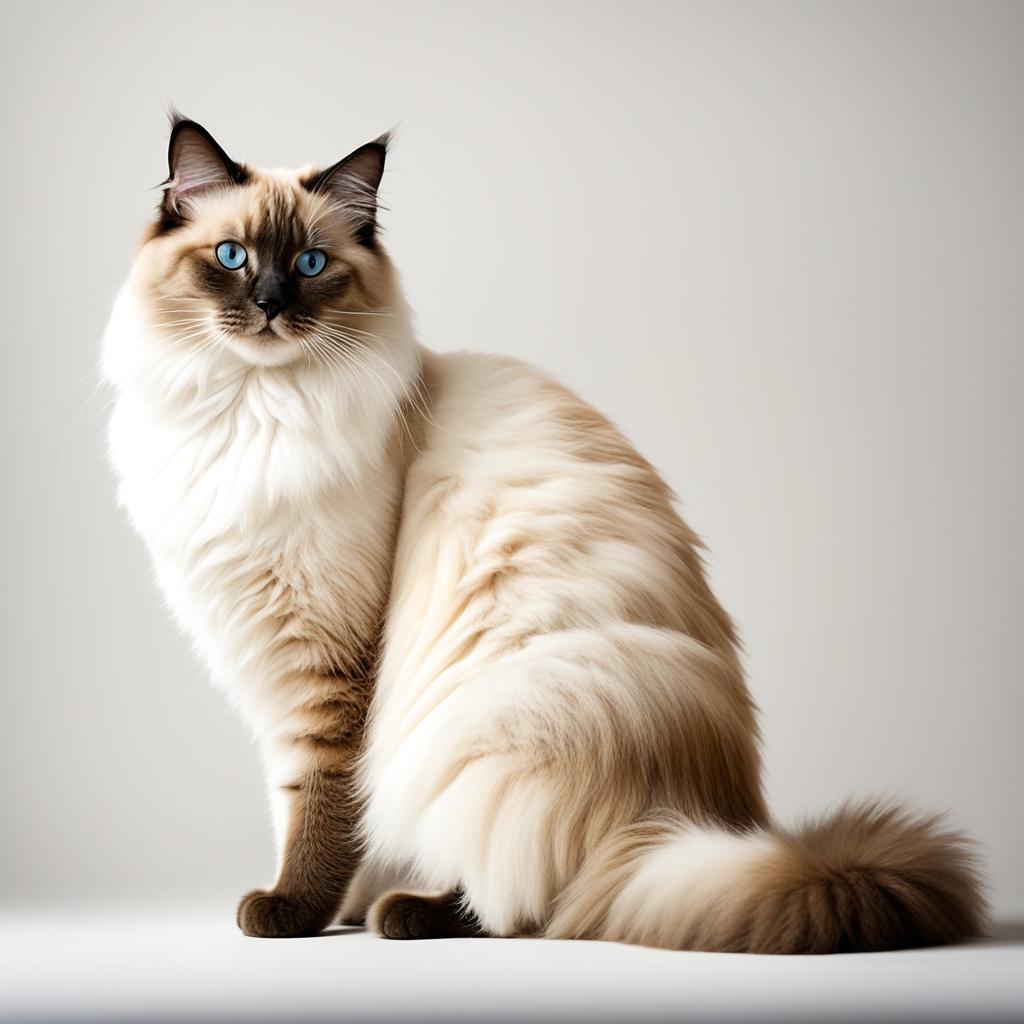
Knowing your Ragdoll’s body condition keeps them in good shape. But, spotting if they’re just a bit hefty or seriously overweight isn’t always easy.
How to Feel for Spine and Ribs
Start with a gentle touch along their spine and ribs. You should feel their bony structure under a light layer of fur. If bones are hard to find, your cat might be too heavy.
Assessing the Primordial Pouch
This mysterious pouch can confuse even seasoned cat owners. It can look very different, either floppy or tight. But, don’t just focus on the pouch. Look for signs like a missing waist to see if your cat is overweight.
Signs Your Ragdoll Might Be Overweight
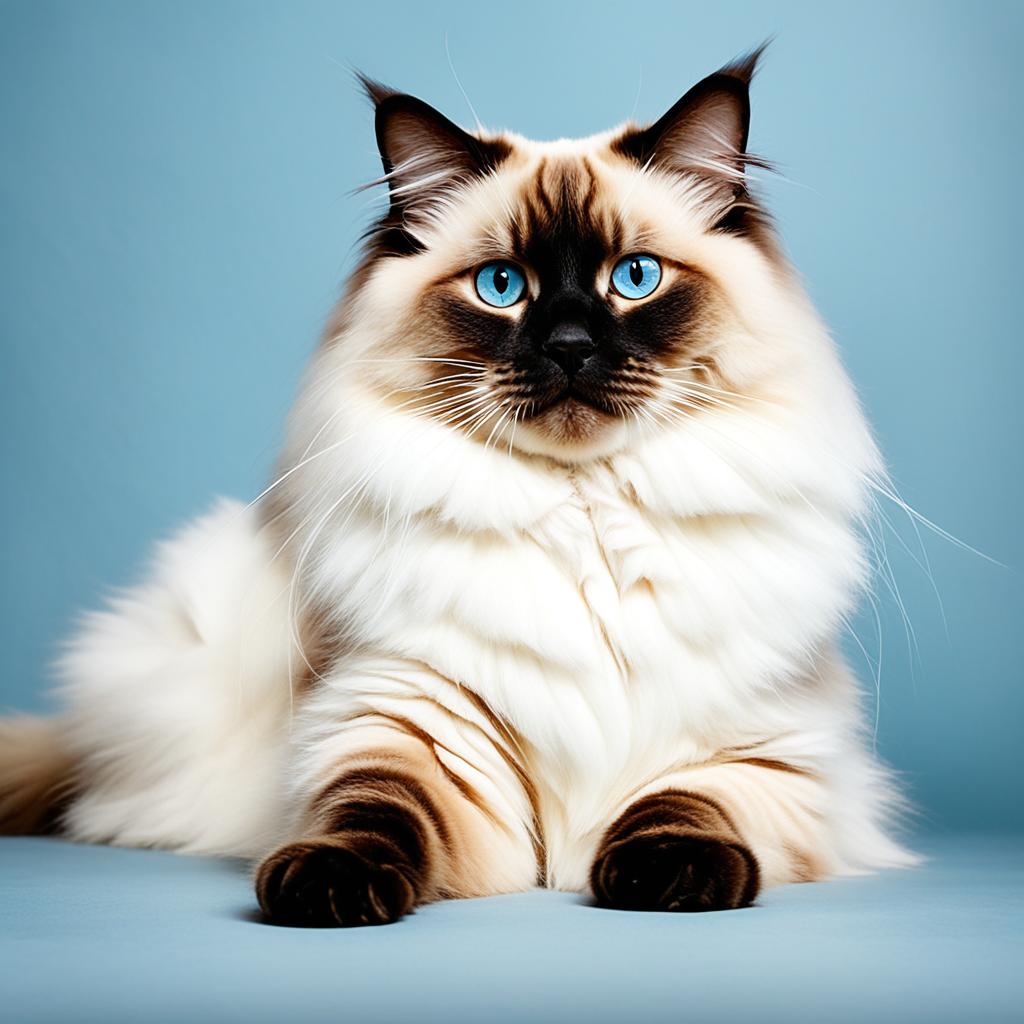
To spot an overweight Ragdoll cat, watch for both physical and behavioral signs. Paying attention can keep your cat healthy and avoid the dangers of obesity.
Visual Clues: What to Look For
If you can’t see your cat’s waistline from above, that’s a sign. A big belly and loose skin also show a problem. If you see these things, it’s time to act to avoid health issues.
Behavioral Changes
Watch for changes in how your cat acts. Is your Ragdoll moving less or not grooming well? These clues signal it’s time to manage their weight to prevent health problems.
Causes of Weight Gain in Ragdoll Cats
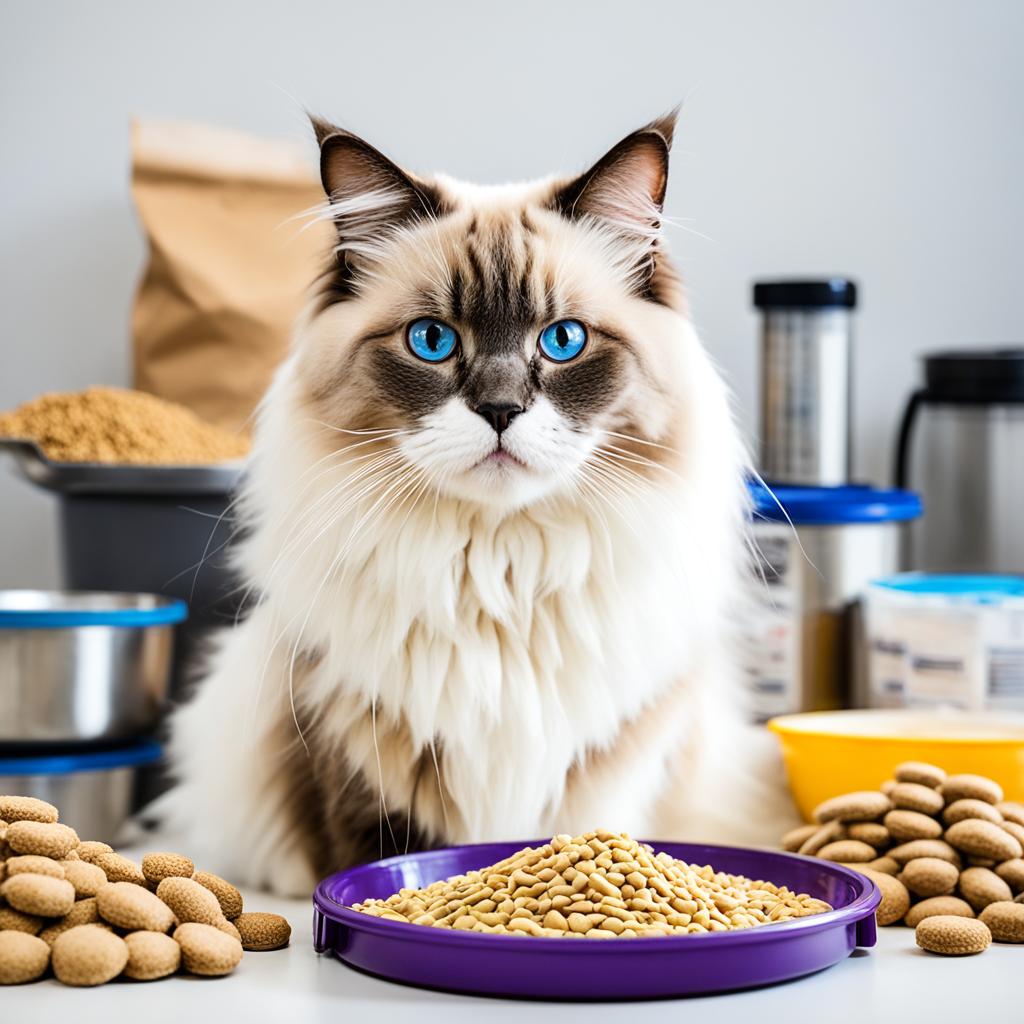
Knowing why Ragdoll cats gain weight is key to helping them. Several things can cause your fluffy friend to get heavy.
Diet-Related Factors
Start by looking at what your Ragdoll eats. Eating more calories than needed leads to weight gain. Big portions and high-calorie food are often the culprits. Choosing quality food, watching portion sizes, and cutting down on treats help a lot.
Activity Level Considerations
How active your cat is also matters. Ragdolls are usually calm. But, if they don’t move enough, they won’t burn off extra calories, leading to weight gain. Making sure they get time to play and explore is important.
Underlying Health Issues
Health problems can also cause weight gain. Things like hormone issues or slow metabolism are common. It’s important to go to the vet often. They can find and treat these problems early. This is crucial for keeping your cat’s weight in check.
What to Do If Your Ragdoll Cat Is Overweight?
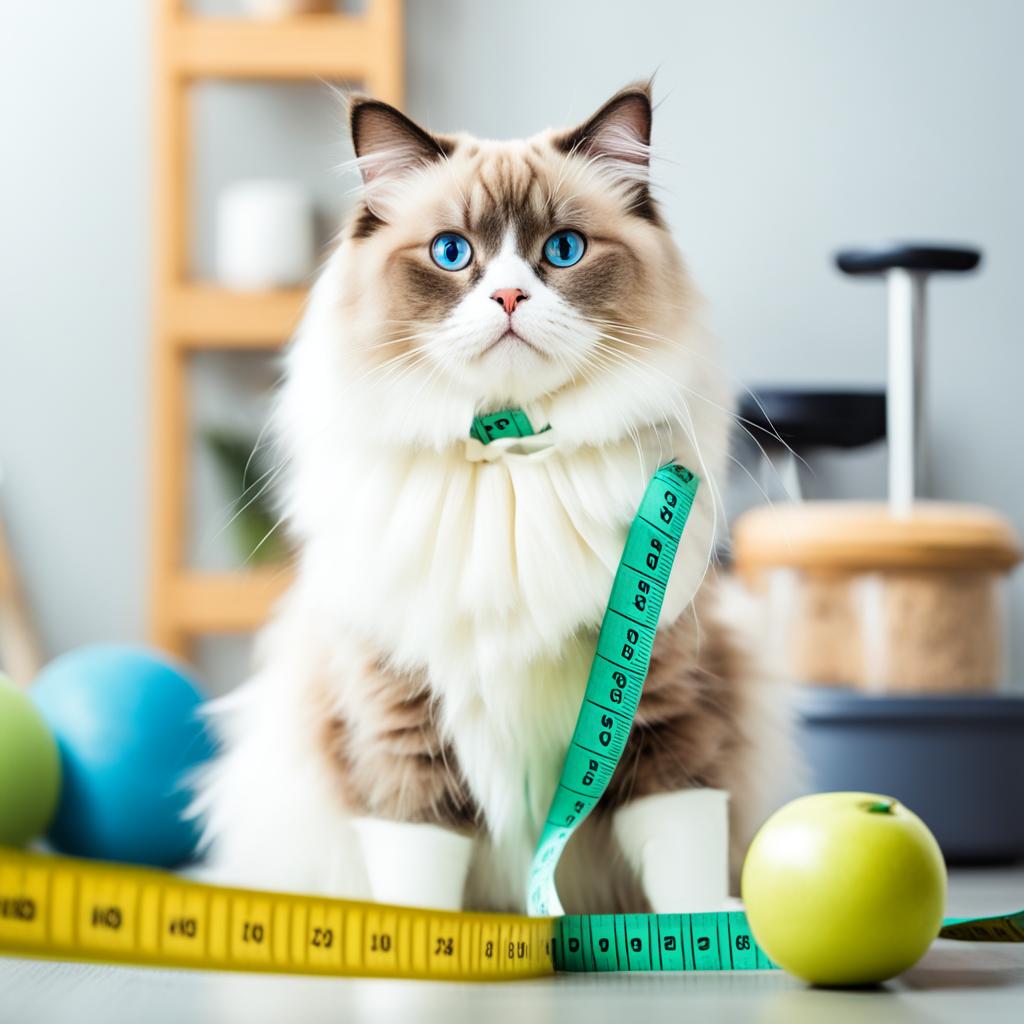
Finding out your Ragdoll is overweight can worry any pet parent. But, don’t worry, there are great ways to help your cat lose weight. These strategies will get your feline friend back to a healthy size.
Consulting with Your Veterinarian
The first thing to do is talk to your vet when you see your cat has gained weight. Your vet will check your cat’s health closely and give you the best advice. They might also look for any health issues that are making your cat gain weight.
Implementing a Weight Loss Plan
After getting your vet’s advice, you can work on a plan to help your Ragdoll lose weight. This plan could mean a diet that’s carefully planned for your cat. It focuses on the right amount of food and the most necessary nutrients.
Remember, don’t make the diet change too fast. Slow changes are better for your cat’s health.
It’s also essential to increase your cat’s exercise. Playing with your Ragdoll and giving them chances to move around more is vital. This not only helps them lose weight but also keeps them happy and active.
Effective Diet Tips for Your Ragdoll
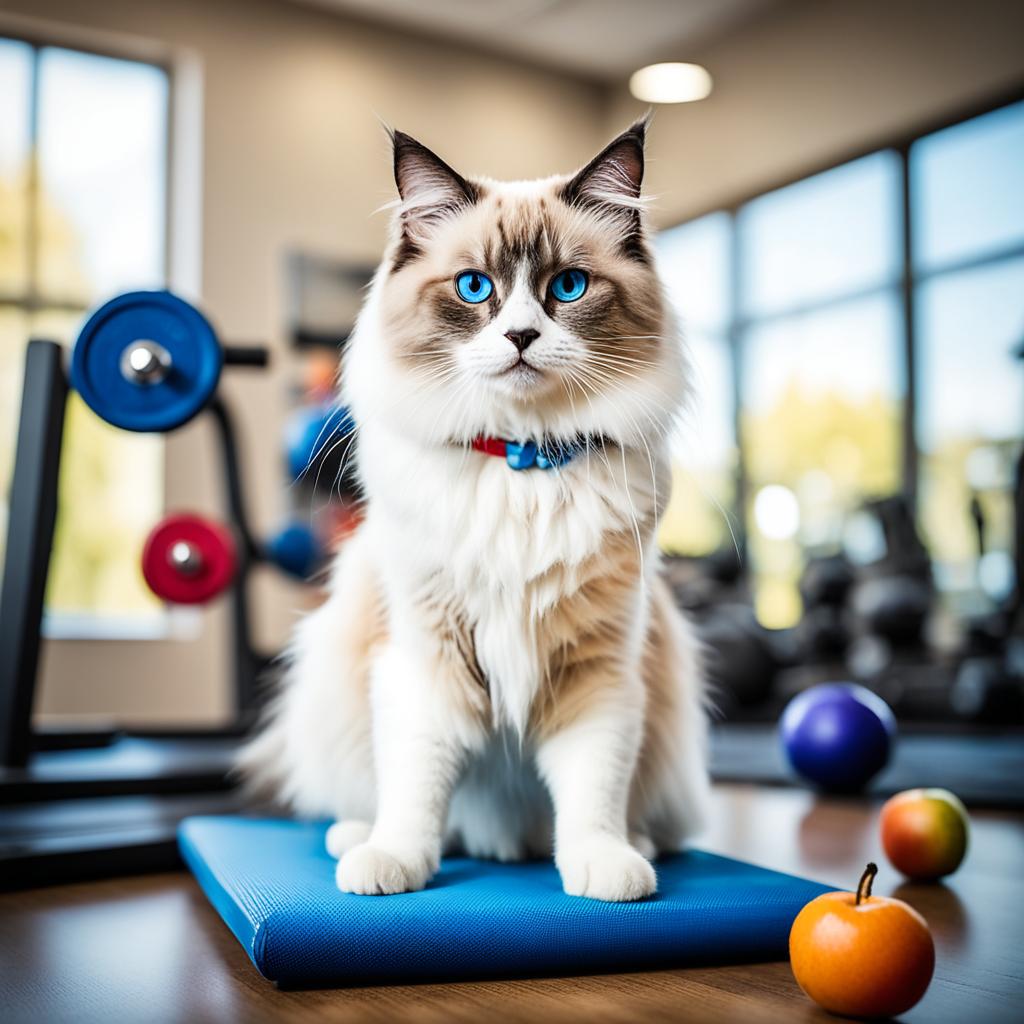
Preventing cat obesity starts with a good diet plan for your Ragdoll. Focus on high protein and low carbs to mimic their natural eating habits. This change helps keep their muscles strong and their hunger at bay.
Find foods made to help cats lose weight. They keep the right nutrients for your Ragdoll’s health. But, start new foods slowly to avoid tummy troubles. This way, your Ragdoll will be more likely to eat them without a fuss.
Here’s a look at different cat food types for weight control:
| Food Type | Key Benefits | Suggested Brands |
|---|---|---|
| High-Protein | Maintains muscle mass, promotes satiety | Wellness Core, Blue Buffalo |
| Low-Carbohydrate | Reduces fat storage, stabilizes energy levels | Nature’s Logic, Merrick |
| Weight Control Formulated | Balanced nutrients, controlled calorie intake | Hill’s Science Diet, Royal Canin |
Making these diet tips part of your Ragdoll’s daily life will help prevent obesity. Remember, be patient and keep at it. Over time, these small changes will bring big health benefits for your cat.
Importance of Regular Exercise
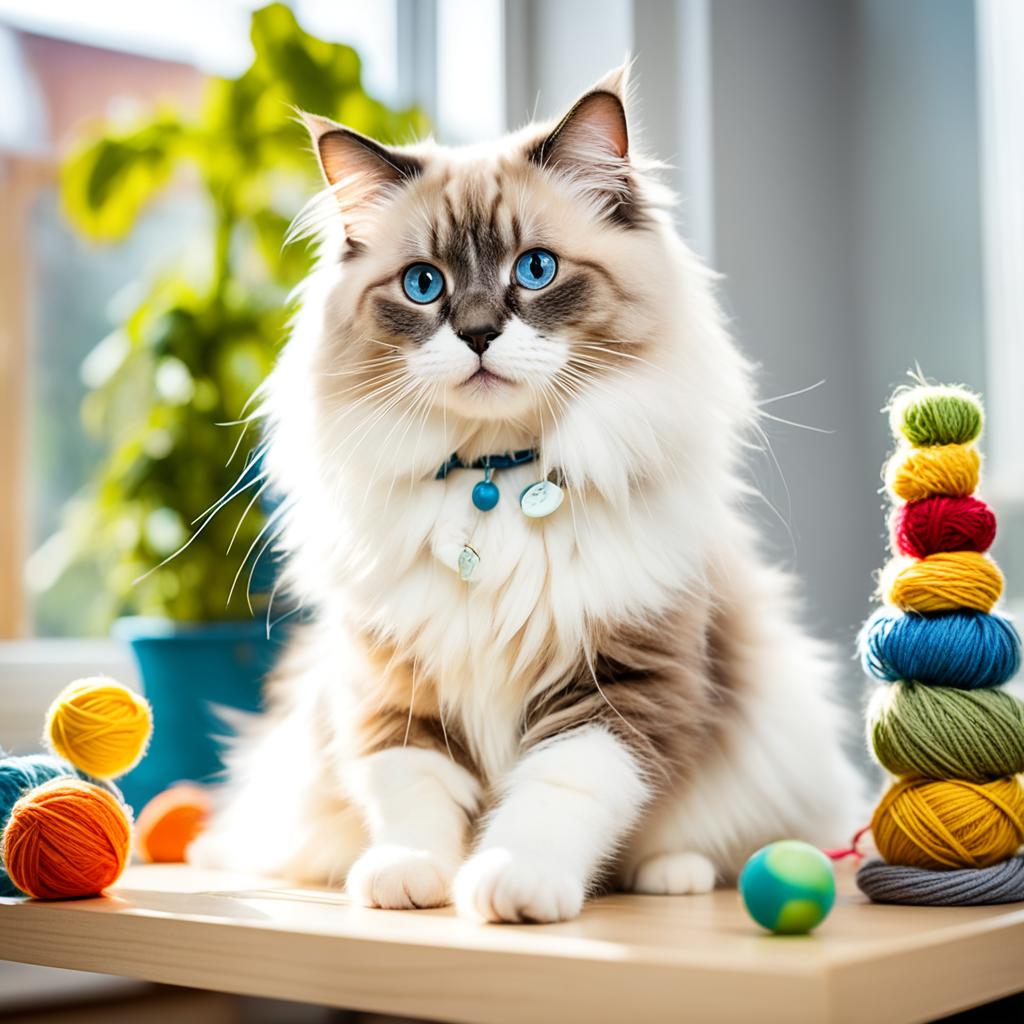
Regular exercise is key for Ragdoll cats to stay at a healthy weight. It does more than just control their weight. Exercise helps their joints stay healthy and lowers their stress level.
Engaging Playtime Activities
Exercising Ragdoll cats can be both fun and beneficial. Use toys like laser pointers and feather wands to get them moving. This not only helps your cat stay slim but also deepens your bond.
Try out puzzle feeders to keep their minds sharp. These feeders challenge your cat both mentally and physically.
Benefits of Cat Trees and Structures
Cat trees and climbing structures help keep Ragdoll cats active. They satisfy your cat’s urge to climb. This natural exercise is good for their health.
These structures provide various surfaces for stretching. This helps to keep muscles strong. They are also a great aid in managing your cat’s weight.
Choosing the Right Food for Weight Management
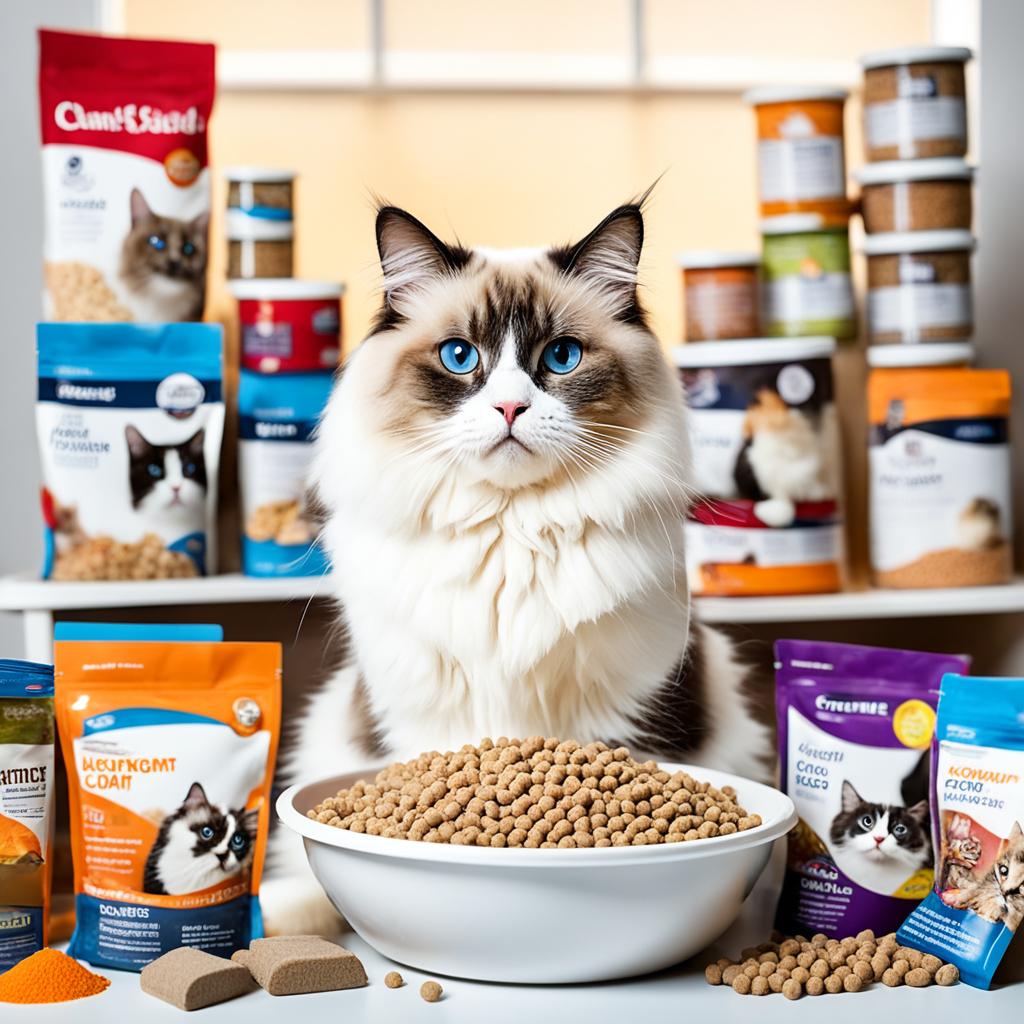
When it comes to your cat’s weight, choosing the right food really matters. You must pick food that meets their special needs. This ensures they stay healthy while controlling their weight.
Understanding Caloric Needs
To understand how much food your cat needs, look at things like their age and how active they are. It’s key to not give them too many calories. Talking to a vet can help you figure out exactly what your cat needs.
Choosing Balanced Nutritional Options
After learning about your cat’s caloric needs, it’s time to focus on nutrition. Look for foods with lots of protein but not too much fat. Wet food is great because it helps keep them full and hydrated while managing their weight. Make sure any food you pick is complete and balanced. This means it has everything your cat needs without extra calories.
| Aspect | Recommended Approach |
|---|---|
| Protein | Select high-quality protein sources for muscle maintenance. |
| Fats | Moderate fat content to avoid excess calorie intake. |
| Hydration | Incorporate wet food to increase water intake and satiety. |
Monitoring and Maintaining a Healthy Weight
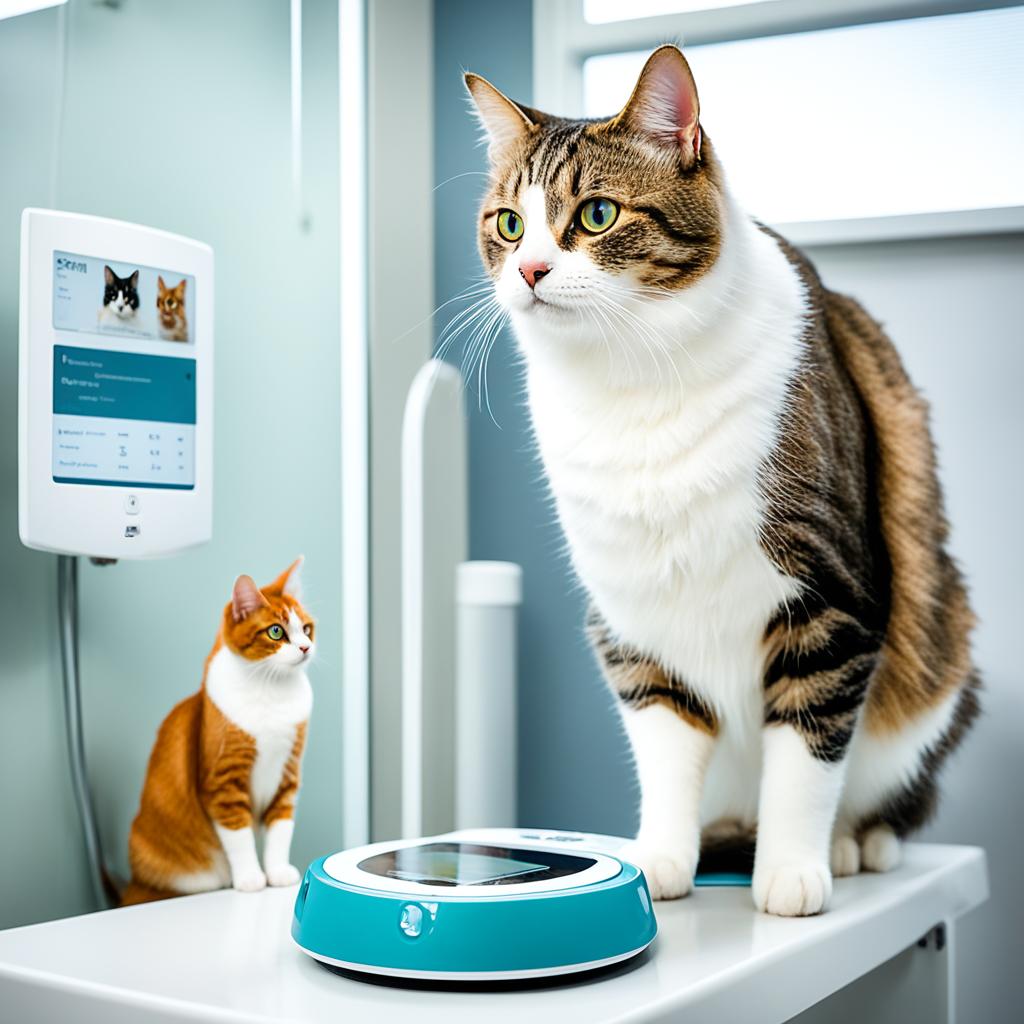
Keeping your Ragdoll’s weight right is crucial. You need to watch them closely and make the right changes in their day-to-day. This means not only checking on them regularly but also being ready to adjust their lifestyle to keep them well.
Regular Weigh-Ins
Frequent weigh-ins are key for a weight management for cats plan. Make sure you have a schedule to weigh your cat often. This way, you can see any changes quickly and figure out if you need to make their diet or playtime different. Always weigh them the same way, at the same time, and with the same scales for best results.
Adjustments and Long-Term Plans
When you have the right regular weigh-ins info, you can adjust what your cat eats and how they play. Change their food amounts and find new games that suit your Ragdoll’s lifestyle. Don’t forget to plan to keep this up for the long run. This includes talking to the vet often to make sure your cat’s weight stays right. Keeping a good balance will not only keep their weight healthy but also their energy high for a fun life.
| Signs | Actions |
|---|---|
| Consistent Weight Increase | Review diet, reduce portions, increase exercise |
| Weight Fluctuations | Consult vet, check for underlying health issues |
| Stable Weight | Maintain current regimen, schedule periodic checkups |
Conclusion
Helping an overweight Ragdoll cat requires a careful plan. This plan should focus on their health. It includes watching their diet, keeping them active, and monitoring their weight. Remember, your Ragdoll is part of your family. Helping them get healthier is rewarding for both of you.
To help your Ragdoll lose weight, focus on their diet and portion control. Use high-quality, healthy food. Encourage them to be active. Playtime helps burn calories and keeps their mood up. Weigh them often to track their progress and make changes to their routine as needed.
Your vet can offer personalized advice. This, combined with your effort, can help your Ragdoll lose weight. The key is to be consistent. Keep your cat moving, feed them right, and track their weight. Eventually, you’ll see a fit, happy, and energetic Ragdoll. You’ll enjoy every moment you spend together.
FAQ
How do I determine if my Ragdoll cat is overweight?
Feel along your cat’s spine and ribs gently. If you can easily feel the bones, there’s probably no extra fat. Check the stomach area. If the primordial pouch is full instead of hanging freely, your cat may be overweight. You might also notice a lack of a waist and a bulging belly from above.
What are the common signs of an overweight Ragdoll cat?
You might notice a round shape and a big stomach. Your cat might also move less if it’s overweight. Grooming could be a struggle for them.
What factors contribute to weight gain in Ragdoll cats?
Eating too much or consuming high-calorie food can cause weight gain. Not getting enough exercise is also a problem. Health issues like hormonal problems might contribute too.
What steps should I take if my Ragdoll cat is overweight?
Start with a visit to your vet. They can help you make a plan to help your cat lose weight. This plan may include diet changes, more exercise, and regular check-ups. Slow diet changes are safer for your cat.
What are effective diet tips for helping my Ragdoll lose weight?
Switch to meals that are high in protein and low in carbs. Find foods specially made for weight control. Add these foods slowly to your cat’s diet.
How important is exercise for my Ragdoll cat’s weight management?
Exercise is key for helping your cat lose weight. Use toys and climbing structures to keep them active. These activities are not only healthy but also fun for your cat.
What should I consider when choosing food for weight management?
Think about your cat’s age, how active they are, and their health. Choose foods high in protein but not too fatty. Wet food can help keep your cat full and hydrated. Always ask your vet for advice.
How can I effectively monitor and maintain my Ragdoll’s weight?
Weigh your cat regularly. Use this info to adjust their food and exercise program. Working with your vet over time will help keep your cat at a healthy weight.




